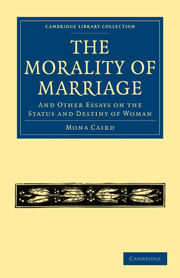Book contents
- Frontmatter
- Contents
- INTRODUCTION
- THE EMANCIPATION OF THE FAMILY
- MARRIAGE
- PART I THE PIONEER OF CIVILISATION
- PART II MARRIAGE BEFORE AND AFTER THE REFORMATION
- PART III THE LOT OF WOMAN UNDER THE RULE OF MAN
- PART IV A MORAL RENAISSANCE
- THE FUTURE OF THE HOME
- THE MORALITY OF MARRIAGE
- A DEFENCE OF THE “WILD WOMEN”
- PHASES OF HUMAN DEVELOPMENT
PART I - THE PIONEER OF CIVILISATION
Published online by Cambridge University Press: 16 May 2011
- Frontmatter
- Contents
- INTRODUCTION
- THE EMANCIPATION OF THE FAMILY
- MARRIAGE
- PART I THE PIONEER OF CIVILISATION
- PART II MARRIAGE BEFORE AND AFTER THE REFORMATION
- PART III THE LOT OF WOMAN UNDER THE RULE OF MAN
- PART IV A MORAL RENAISSANCE
- THE FUTURE OF THE HOME
- THE MORALITY OF MARRIAGE
- A DEFENCE OF THE “WILD WOMEN”
- PHASES OF HUMAN DEVELOPMENT
Summary
“Now I could multiply witness upon witness … I could go back into the mythical teaching of the most ancient times, and show you how … that great Egyptian people, wisest then of nations, gave to their Spirit of Wisdom the form of a woman; and into her hand for a symbol, the weaver's shuttle; and how the name and form of that spirit adopted, believed, and obeyed by the Greeks, became that Athena of the olive-helm and cloudy shield, to whose faith you owe, down to this date, whatever you hold most precious in art, in literature, or in types of national virtue.”
—Ruskin, “Sesame and Lilies.”There is no social philosophy, however logical and far-seeing on other points, which does not lapse into incoherence, as soon as it touches the subject of woman. The thinker abandons the laws of reasoning which he has obeyed until that fatal moment; he forgets every principle of science previously present to his mind, and suddenly descends to a lower intellectual plane, making statements that any schoolboy might scorn. Our philosopher—once so strict in logical inference—takes the same view of women as certain Indian theologians took of the staple food of their country. “The Great Spirit,” they said, “made all things, except the wild rice, but the wild rice came by chance.” Women are the wild rice of the modern philosophical world.
- Type
- Chapter
- Information
- The Morality of MarriageAnd Other Essays on the Status and Destiny of Woman, pp. 63 - 72Publisher: Cambridge University PressPrint publication year: 2010First published in: 1897



